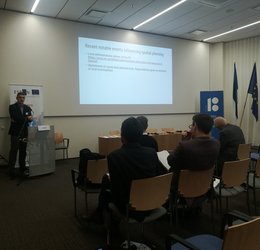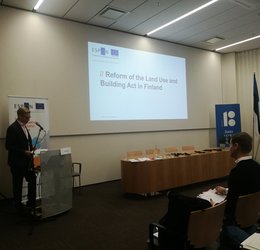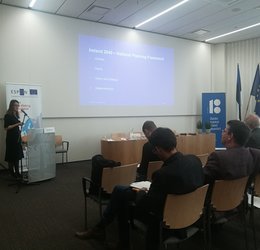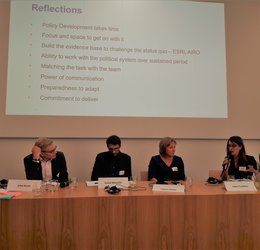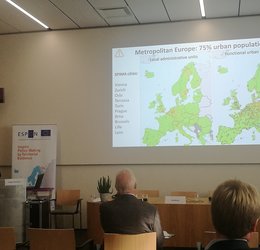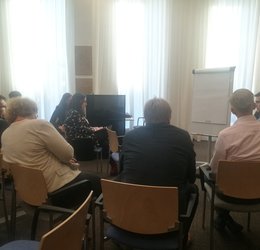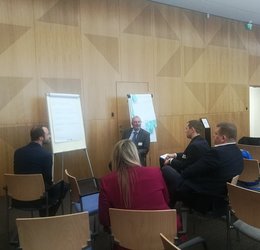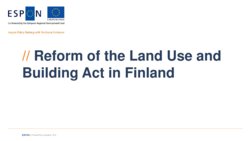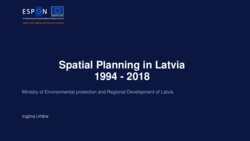New challenges and thinking for spatial planning systems
Insights from ESPON projects
Venue
Tallinn, Estonia
Estonian Ministry of Finance
10129 Tallinn
Estonia
Registration
Register for this event
New challenges and thinking for spatial planning systems
Should spatial planning be more visionary, integrated, comprehensive or more light touch and flexible with an emphasis on continuity and stability rather than constant change? What is the role of the regional level of strategic and spatial planning between the national and local dimensions? These were the topics discussed by the participants at the ESPON Transnational Outreach Workshop at the Estonian Ministry of Finance in Tallinn on the 16th October 2018.
This ESPON workshop examined some of the issues faced by the Estonian planning system and the challenges described by the Green Book that is being prepared. These issues include the difficulties of combining strategic and land-use planning; supporting a regional level of planning without a regional administration; dealing with the inherent complexity and rigidity of spatial planning and involving an increasingly wider set of stakeholders in the planning process.
Four country experts from Finland, Slovenia, Latvia and Ireland outlined their challenges and the way that they were dealing with these challenges. Latvia highlighted the need for more pragmatism, more flexibility, more transparency and improved capacities at the local level which requires a new generation of spatial planners. Finland is preparing the reform of the ‘Land Use and Building Act’ and developing a draft for a government proposal. Also, Finland’s possible wider change in local vs regional administration (health and social) may in the longer run have implications on regional level spatial planning. Ireland presented their recently approved ‘Irish National Planning Framework’, a promising and profound approach in dealing with the country’s spatial questions. Slovenian latest ‘Spatial Management Act’ in 2017 needs to deal with the need to design and moderate a process rather than designing a plan; overcoming the weaknesses of sectoral planning by improving dialogue and capacity building; more participation and less information and increasing the digitalisation of spatial planning.
ESPON projects and policy briefs then added to the country expert input. The RESSI project[1] illustrated with two case studies the need for the regional level to play a brokering role, building consensus and trust between municipalities and acting as a bridge between national and local strategies. The COMPASS project[2] examined spatial planning systems across Europe and their changes over time – e.g. widening of planning’s scope, decentralisation, shift towards regulatory (vs visionary) planning. The SPIMA project[3] examined metropolitan governance and noted that there is no single definition of a metropolitan area that matches the urbanization trends, administrative borders, planning practices and perceptions of local actors and outlined current trends such as decentralisation, widening scope, administrative simplification and improving performance and citizen engagement and digitalisation. ESPON policy brief on Indicators for Integrated Territorial and Urban Development[4] highlighted the needed on the actual content, territorial coverage, budget and scope of the integrated strategies and their purpose.
Discussions during the day raised a strong consensus among participants to focus on systems and dialogue with attention to capacity building among key stakeholders and for the need of a ‘regional’ dimension of spatial planning between the national and the local levels. Establishing this regional level, especially where there are no regional administrations or new regional administrations (as in the case of Ireland) is not easy. Adequate resources, cooperation and leadership will be key watchwords for success.
[1] ReSSI – Regional Strategies for Sustainable and Inclusive Territorial Development https://www.espon.eu/ressi
[2] COMPASS – Comparative Analysis of Territorial Governance and Spatial Planning Systems in Europe https://www.espon.eu/planning-systems
[3] SPIMA – Spatial Dynamics and Strategic Planning in Metropolitan Areas https://www.espon.eu/metropolitan-areas
[4] ESPON Policy Brief: Indicators for Integrated Territorial and Urban Development https://www.espon.eu/integrated-indicators

